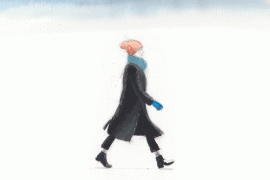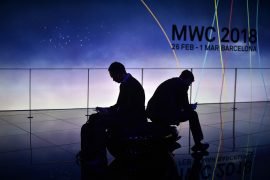[dropcap letter=”T”]
he fight for freedom is continuous throughout history, but there are times when this battle is made even more visible. The twentieth century is a good example. Never had humanity caused so many disasters altogether. Nationalism, fascism and communism literally devastated the old continent, opening deep scars all over the globe, many of which are still present. Almost until the end of the century, the world experienced a virtually continuous series of wars, amongst which the two world wars and our tragic civil war. It is the century of collectivism, as Paul Johnson rightly points out in his fundamental Modern Times, collectivisms, however, that not everyone gave up.
 Two outstanding figures of the last century are Winston Churchill and George Orwell: two lives developped from different origins, of very different kinds, although with many meeting points, which are intertwined in a wonderful book by Thomas E. Ricks, award-winning reporter and expert in national security, Churchill and Orwell. The Fight for Freedom (Penguin). The lives of both would be marked by the struggle for freedom: Churchill was the first, and for almost a decade the only one, to alert the world of the dangers of negotiating with a demon named Adolf Hitler; Orwell, writer and reporter of the left-wing world, demonstrated the greatest bravery of all by judging severely his own “side”, being one of the most lucid voices when denouncing the abuses of the Soviet Union, very visible already in the Spanish Civil War, where he participated as a volunteer in the republican side. Both adventurers, both brave -the two will be close to death several times-, both Englishmen, both defenders of freedom; a defence, in addition, non-utilitarian or Cartesian, but with a noticeable moral gravity.
Two outstanding figures of the last century are Winston Churchill and George Orwell: two lives developped from different origins, of very different kinds, although with many meeting points, which are intertwined in a wonderful book by Thomas E. Ricks, award-winning reporter and expert in national security, Churchill and Orwell. The Fight for Freedom (Penguin). The lives of both would be marked by the struggle for freedom: Churchill was the first, and for almost a decade the only one, to alert the world of the dangers of negotiating with a demon named Adolf Hitler; Orwell, writer and reporter of the left-wing world, demonstrated the greatest bravery of all by judging severely his own “side”, being one of the most lucid voices when denouncing the abuses of the Soviet Union, very visible already in the Spanish Civil War, where he participated as a volunteer in the republican side. Both adventurers, both brave -the two will be close to death several times-, both Englishmen, both defenders of freedom; a defence, in addition, non-utilitarian or Cartesian, but with a noticeable moral gravity.
Through the pages of Hicks’s book, that are passed agilely just like with the best of the novels (both characters are novel characters), the reader makes acquaintance with the biography of both figures, which offers two honest points of view, two different perspectives over some crucial years of universal history, in which very few were able to maintain sufficient moral height, intellectual honesty and strength of spirit not to be carried away by the totalitarianisms that would sweep away the democratic order, rather consolidated since the mid-nineteenth century, as it is described in Stefan Zweig’s classic memoirs The World of Yesterday (Pushkin Press).
What stands out in Churchill’s life? Few lives have inspired so many commentaries to be written. Few lives are so stimulating to understand the concept of freedom. Hicks has the ability to highlight the essentials (as he also does later with Orwell). Churchill was a moral leader, a statesman with a deep sense of duty (his two convictions were freedom and integrity of the Empire, the two sides of the same matter for him). Churchill lead a gargantuan life, being an excessive person: he wrote, painted, drank champagne as few, smoke as few. He had a titanic capacity for working (one just needs to have a look at the monumental work he wrote: his WWII memories are thicker than Gibbon’s study of the fall of Rome), and was an experienced strategist and military (he participated in armed conflicts on all continents, including the two world wars: he had an important role in the first, a decisive one in the second).
Churchill is also an example of how a person’s leadership can change the course of history. Without him, undoubtedly -all biographers agree-, the history of Europe would have been very different. His ability to overcome failures and mistakes (which were not few) and transform them into lessons is today a potent reminder of the vital importance of enthusiasm and resilience to succeed in life. Churchill was prisoner in the Boers’ war, was ruined in the Crash of 1929, was severely run over in New York (he almost departed), had grave military failures, such as Gallipoli, or errors of serious political and economic concern. However, always and every time he knew how to recover, pull ahead and, in addition, never lose the sense of humour.
What about Orwell? Again, another intense, changing, life, full of heroic moments and also important misperceptions. Orwell, born Eric Blair -he took the pen name after his early writings, he did not think he would have any success-, of humble origin (unlike Churchill) he studied at Eton thanks to a scholarship and, just like Churchill, sought adventure in the confines of the Empire, in his case in India. He wrote against colonialism and joined socialist organizations, being initially an enthusiast of the Bolshevik Revolution (like many others, like Presidents Wilson or Roosevelt, not so the always lucid in Churchill moral issues). This enthusiasm took him to Spain, to Barcelona, where, as Hicks points out, Orwell became Orwell. It was in Barcelona, as reflected by the English writer in Homage to Catalonia (one of the most read international works to approach Spain’s Civil War), where Orwell discovers the perverse dynamics of Stalinism, a kind of bullying state that he will later reflect on two immortal novels: 1984 and Animal Farm. Two universal novels that are, still, the most ferocious, understandable and lucid criticism of the consequences that derive from totalitarian regimes, especially the communist one.
Both, Churchill and Orwell fought for freedom in their own way -with common elements- and alone, which involved rowing against the current, leaving the mass, and having to face their own political allies. A delightful book, not only about freedom from a theoretical point of view, but about how to exercise it with responsibility, tenacity and constancy. Two model figures who are especially inspiring in our present, liquid world, that lacks clear moral leadership.

















